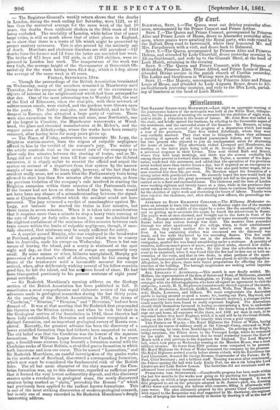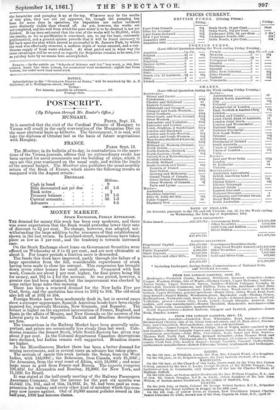giurburnits.
THE BAKERS' SHORT-TIME MOVEMENT.—Last night an aggregate meeting of the journeymen bakers of the metropolis was held at the White Hart, Giltapur- street, for the purpose of assisting the movement for the abolition of night work, and to obtain a reduction in the lYours of labour. Mr. John Rose was called to the chair, and briefly opened the business, by alluding to the favourable aspect of the movement, and the successful state of the finances. Mr. Bennett, on being called on, gave an account of the progress of a deputation which had made a tour of the provinces. They first visited Edinburgh, where they were very cordially, received. They next went to Glasgow, where they addressed a meeting of upwards of six hundred journeymen bakers, and there were but two present who objected to join an amalgamated union for shortening the hours of labour. They afterwards visited Liverpool and Manchester, the meeting at the latter place being held at St. George's Hall, and there was a universal response in their favour. They next visited Bath and Bristol, where they held large meetings, and there was the utmost cordiality felt among those present to forward their cause. Mr. Taylor, a member of the depu- tation, confirmed this statement, and added that the operatives of the provinces never worked more than twelve hours a day, but if required on an emergency to work more, they were paid overtime. They were also paid better wages, for no man received less than 24s. per week. Mr. Morrison urged the formation of a strong union with provincial towns. He sincerely hoped the men would back up the committee, so that this great movement might not fall to the ground, but be carried on to a final and successful issue. The chairman said the men of London were working eighteen and twenty hours at a time, while in the provinces they never worked more than twelve. He entreated them to continue their exertions for the abolition of night work and shortening the hours of labour. Thanks were then voted to the chairman, and, after electing new officers, the proceedings ter- minated.
ATTEMPT TO BURN KILKENNY COLLEGE.—The Kilkenny Moderator re- ports an attempt to burn this institution. On Monday night one of the masters was awakened in the middle of the night by a noise like the smashing of sticks, i and on getting up to ascertain the cause, he found the school-room in flames. The pupils were at once alarmed, and brought out to the lawn in front of the college. Prompt assistance and a good supply of water eventually overcame the flames before any serious damage was done. The masters then proceeded through the other apartments of the college, when, to their astonishment and alarm, they found another fire in the usher's room on the ground floor. A box containing clothes was consumed ere the discovery was made, and the walls blackened by the ascending flames. This fire could not have been originated by the one in the schoolroom. On further in- vestigation, another fire was found smouldering under a staircase. A quantity of matches, half-consumed pieces of paper, and ignited sticks, showed how delibe- rately the incendiary had set to work. By this time the schoolroom was in a state to be examined, when it was found that the fire bad broken out at both ex- tremities of the room, and that in two desks, in other portions of the apart- ment, half-consumed matches and paper had been placed to aid the conflagration. Altogether in five places, there were found preparations for effecting the des-
truction of building. The borough magistrates are making active inquiries into this extraordinary affdr.
ALL ENGLAND v. AUSTRALIA.—This match is now finally settled. Mr. Menem, the representative of the firm of Spiers and Pond, of Melbourne, attended on the ground at Ashton-park, Birmingham, on Friday and Saturday last, and arranged with the following players, who have all signed an agreement to visit the antipodes namely, H. H. Stephenson (unanimously elected captain of the team), Caffyn, E. Stephenson, Mortlock, Griffith. Sewell, Wells, Tom Hearne, G. Ben- nett, Mudie, Lawrence, and Iddison. We must congratulate the Australian public in having secured so good a team; for, leaving out Parr, Hayward, and Carpenter (who have declined on account of domestic motives), a stronger twelve could scarcely have been found to really represent England. The Australians should think themselves favoured in having so enterprising a firm to undertake the risk of an outlay of something like 70001.; the terms being a first-class pas- sage out and home, all expenses whilst there, and 1501. per man in cash, to be deposited before they leave England, which it is said will be by the Great Britain, sailing on the 18th of October. We heartily wish them a good voyage. TIIE PRINCE OF WALES. —His Royal Highness the Prince of Wales, having completed his course of military study at the Curragh Camp, returned on Wed- nesday evening, by train, from Newbridge to Dublin. On arriving at the King's- bridge terminus, the Prince drove to the Viceregal Lodge, where he remained for the night. It was understood that lie would yesterday honour the Earl of Meath with a visit previous to his departure for England. The Lord Mayor's ball, which took place on Wednesday evening at the Mansion House, was a most brilliant reunion. No fewer than 2500 persona were computed to be present. His Royal Highness the Prince of Wales honoured the company by his presence His Royal Highness arrived shortly before eleven o'clock, with his Excellency the Lord Lieutenant, General Sir George Browne, Commander of the Forces; Sir R. Peel, Chief Secretary; and a brilliant staff. Dancing was soon after commenced, the Prince opening the ball with Lady Emily Peel, the vis-a-vis being the Lord Lieutenant and Lady Barlow Leeson. The festivities did not terminate until an advanced hour yesterday morning. PURIFYING THE SERPENTINE.—Considerable progress has been made within the last few months in the works now going on for purifying the Serpentine in Hyde-park, on which a large number of vrorkmen have been engaged. It was at first proposed to act on the principle adopted in St. James's-park, viz. draining off the water and covering the bottom with concrete, filling it afterwards with pure water. The plan ultimately adopted by the present Chief Commissioner with regard to the Serpentine was that suggested by Mr. Hawksley, the engineer_ —that of keeping the water continually in motion by drawing it off at the end of
the Serpentine and pumping it up at the top. Whatever mAy be the merits of this plan, they are not yet apparent, for, though the pumping has been for some time in operation, the impurities are rather rendered more distinctly visible than cleared off. As yet, however, the works are not completed, and the well from which the pure water is to be obtained is not yet finished. It has been estimated that the cost of the works will be 20,0001., while the results, so far as purification is concerned, are, to say the least, extremely problematical, and a general opinion prevails that it will be found necessary to &11 back upon the plan which proved so successful in St. James's Park, by which the mud was effectually removed, a uniform depth of water ensured, and a con. tinuous supply of fresh water obtained. At what period and in what way the same advantages will be secured as regards the Serpentine remains to be seen, but as yet they have by no means been accomplished.































 Previous page
Previous page